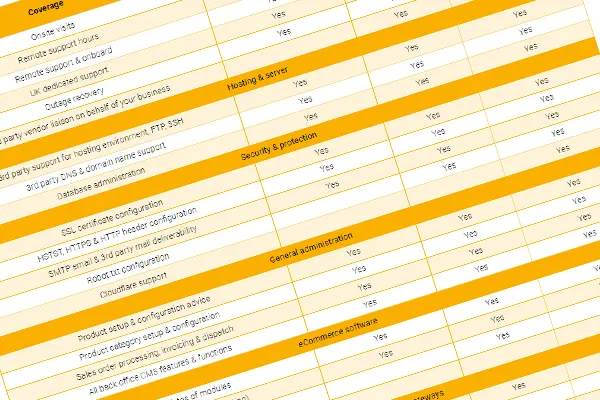Craig Blackman
19 January 2022
eCommerce
Craig Blackman
19 January 2022
eCommerce website support and maintenance are a field that requires the individual to have a broad and deep knowledge of all the areas associated with eCommerce, such as hosting, security, platform centric working knowledge, and that’s just to start.
It’s not so difficult these days to set up and run an e-commerce website, and many businesses get by. Where the problems arise is with growth, which invariably leads to a larger footprint, a bigger platform, and many more people needing to use the site, all which makes maintaining a website far more complex.
Web services make up a large part of many businesses’ online presence, and the risks associated with them can be staggering. Many small and medium-sized businesses do not have the necessary resources to manage the risks that come with web services, particularly those required for eCommerce, but risk is inevitable.
We have seen it all, and the aim of this article is to help put some perspective on what it takes to support and maintain a full-scale eCommerce store, and some reasons why outsourcing these services can prove a more profitable and efficient way of managing your eCommerce infrastructure.
Conversely, if you have the internal skill set, let’s demystify what’s required to design an eCommerce website support and maintenance plan for in-house use.

Not all eCommerce platforms are equal, and all have their own unique needs to make sure they are properly maintained.
Our eCommerce Website Maintenance Plans have been built over years of experience and include what’s required to maintain and manage enterprise platforms such as Magento 2 and the more plug-and-play platforms such as WordPress and Woocommerce. In reality, all platforms have the same core requirements; the difference is in their size, the complexity of integration with third-party software such as Enterprise Resource Planning Software (ERP), and their features and functionality.
We can break down the overarching maintenance plan into subsections, such as:
From here, we can start to think about what tasks we need to think about under each subheading.
For example, hosting and servers, we have tasks such as:
You can tailor your points to meet your needs.
We then have the more complex and incredibly vital aspect of eCommerce website security:
The end result is a very long list of tasks that need to be scheduled and coordinated by individuals who have the deep-rooted knowledge required to do this.
Planning is crucial to success and, if done right and kept on top of, will make it easier each and every time it’s completed. This is why we offer a range of eCommerce Website Maintenance plans that have been designed to tackle the full length and breadth of your eCommerce footprint, from simple WordPress and Shopify sites through to complete custom enterprise sites such as Mangeto 2, Prestshop and more.

To support an eCommerce website, you not only need to understand the infrastructure as detailed above, you also need to understand the content management system you are working with, and more importantly, you need to have a commercial understanding of how the business you are supporting works.
Again, we can categorise and group the top-level elements of what would make a good starting point for eCommerce website support. What we do find, and rightly so, is that the contents of your maintenance plan and support plans will overlap. What you maintain, you will need to support, and vice versa.
Below are a similar set of subheadings to the overarching eCommerce Website Support Plan:
Looking at general administration, for example, we have all been in the position where you try to add a product and it throws up an error, you can’t locate a setting you need to change, or the more dire scenario where your site goes down and sends a dreadful server 500 error to your customers.
The crux of Support will be around SLA and coverage. We like to include for example:
Again, you can see that you have to have an individual onboard who takes a pragmatic approach to support, is calm under pressure and will accept help when it’s needed. No one person knows everything. Approaching someone that might help shows a willingness to learn.
Where website support services differ from website maintenance services is in that they are reactive vs. proactive. The hope is that maintenance will mitigate the need for as much support as your housekeeping will be done, and this alone will ensure that you are on top of and aware of any potential issues.
That said, all websites need someone to support them. Whether this is internal to the business or outsourced to a third party, the end goal is the same. The only difference is the cost and the ecommerce customer experience you want to provide.
It’s a really hard decision to make, and we have been on both sides of the fence. To really appreciate and understand which route is best for your business, you need to be honest and ask a few questions about your business and your team.
These are just a few of the questions we will ask you, and if the answer is unsure, we will help you to understand how to get the answers.
Yes, there are a number of benefits to outsourcing website support and maintenance.
Let’s look at just a few reasons for what these benefits are and why I would personally consider them critical to your business.
There is no right or wrong answer to this question, and it is as much about the scales of the economy as it is a desire to retain ownership of your web services.
If you opt to continue catering to this in house, you have the headaches of managing staff, continuity of resources, and developers coming and going, who are not all equal.
Is it possible to provide a single person for a smallish site with that level of capability and knowledge required to do this properly without risking your reputation and damaging your online visibility?
Yes, it can work. Moreover, an eCommerce site hits a point where outsourcing eCommerce maintenance and support becomes far more valuable. The knowledge and experience of a good service provider can be leveraged to your benefit and help you catapult your eCommerce spend to the next level.
Everyone will have their own take on this, and you can’t apply the same rules to every business. You have to take each site on its merits, and weigh up the pro’s and con’s to which route is best for you.
My honest opinion is that “nothing ventured, nothing gained.” So many times we have worked with clients that have been sceptical that even engaging in a hybrid fashion using such a service provider to field issues that can’t be managed in-house, we do see an uptake over time where more and more of the issues are outsourced.
Why? Because the value is there and, ultimately, it frees up the team to be more productive with customer service, sales and other business functions.
If you wanted to find out a bit more about how we can support and maintain your websites, contact us for more information.
Think or can help or need to talk? Book an online Teams meeting today or call 01903 372 402
Contact us details can be found below. If you fancy a chat, please feel free to call.
Demystify Digital Limited is a limited company registered in England and Wales. Registered number: 13844077.
© 2022 Demystify Digital Limited. All rights reserved
| Cookie | Duration | Description |
|---|---|---|
| cookielawinfo-checkbox-analytics | 11 months | This cookie is set by GDPR Cookie Consent plugin. The cookie is used to store the user consent for the cookies in the category "Analytics". |
| cookielawinfo-checkbox-functional | 11 months | The cookie is set by GDPR cookie consent to record the user consent for the cookies in the category "Functional". |
| cookielawinfo-checkbox-necessary | 11 months | This cookie is set by GDPR Cookie Consent plugin. The cookies is used to store the user consent for the cookies in the category "Necessary". |
| cookielawinfo-checkbox-others | 11 months | This cookie is set by GDPR Cookie Consent plugin. The cookie is used to store the user consent for the cookies in the category "Other. |
| cookielawinfo-checkbox-performance | 11 months | This cookie is set by GDPR Cookie Consent plugin. The cookie is used to store the user consent for the cookies in the category "Performance". |
| viewed_cookie_policy | 11 months | The cookie is set by the GDPR Cookie Consent plugin and is used to store whether or not user has consented to the use of cookies. It does not store any personal data. |